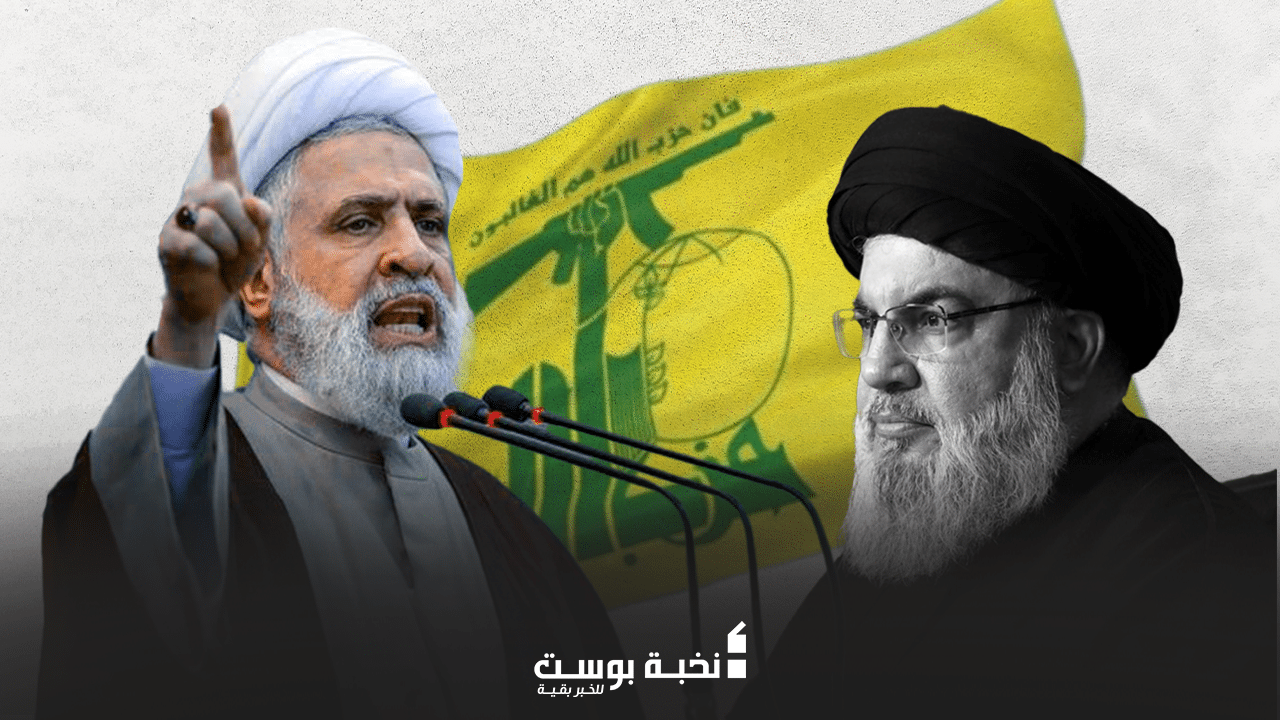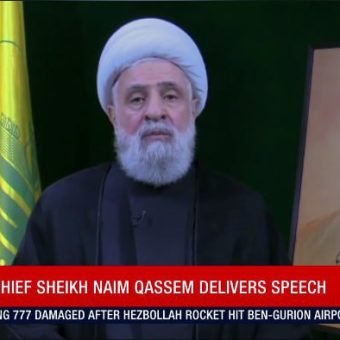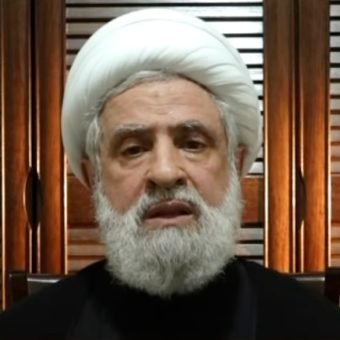Speech by Hezbollah Secretary General, Sheikh Naim Qassem, on the occasion of Hezbollah Martyr’s Day.
Naim Qassem: Lebanon Shall Not Bow to Israeli Diktats
elow is the full translation of the political section of this speech.
1/ Gaza: Trump’s Deportation Plan
2/ Lebanon’s Internal Situation
The Presidential Election and Government Formation
Israeli Withdrawal from Southern Lebanon on February 18 and Reconstruction
Government Action
The Ban on Iranian Airlines Landing in Lebanon
3/ The Funerals of Sayyed Hassan Nasrallah and Sayyed Hashem Safi al-Din
Source: Al-Manar
Translation: resistancenews.org
[…] I now turn to recent political developments. I will address three points.
1/ Gaza: Trump’s Deportation Plan
First, Trump’s stance on the Palestinian cause and Palestine itself is extremely dangerous. His goal is to eradicate Palestine and its people, a political extermination attempt following Netanyahu and the United States’ failure to achieve direct physical extermination through the recent Israeli aggression against Operation Al-Aqsa Flood. This aggression resulted in 160,000 casualties, including both the dead and wounded, along with a large number of prisoners—not to mention the massive destruction inflicted upon the Gaza Strip.
Trump seeks to dominate the world, not just Palestine. But what concerns us most is that this political extermination he aims to impose—working in tandem with Netanyahu, who himself pursued human extermination but failed—is entirely unworkable against the proud, resilient, and legendary Palestinian people, who have made immense sacrifices. As far as they are concerned, these are mere illusions.
Yet, this reveals the malevolent and shameful international stance now championed by the United States. More than ever, it is clear that everything Israel does is directed, managed, supported, armed, and publicized by the United States. Israel serves a single function in this region: to spread destruction, expand further, and deepen its occupation, all in service of US expansionist ambitions. But, with God’s grace, this will not come to pass.
This US project is a threat to all: a danger to Arab countries and to Islamic nations alike. It is no longer just a “Palestinian issue”; rather, it is an Israeli occupation under US control, seeking to uproot Palestine and the Arab region while striving for global domination. We must view the situation through this broader lens rather than a narrow one.
The Arab and international silence that prevailed during the aggression against Gaza and in the face of the Al-Aqsa Flood has only strengthened this US posture. What would Arab countries have lost had they taken retaliatory measures? Even something as simple as banning [Israel] from using their ports, roads, or airspace. If every state had imposed certain restrictions and made strong, resolute statements, the situation would undoubtedly have shifted.
Yet here we are: yesterday, we faced an aggression targeting only Palestine, and today, Trump threatens the entire region. He wants to deport Palestinians to Egypt, Jordan, Saudi Arabia, and other countries.
We firmly condemn and reject any attempt to forcibly displace Palestinians, regardless of the destination. We refuse their expulsion to Egypt, Jordan, and Saudi Arabia. These nations must protect themselves, remain vigilant, cooperate, and oppose this maneuver with unwavering resolve—for the sake of Palestine and their own peoples. Likewise, we reject any displacement to Lebanon or elsewhere.
We affirm that Palestine extends “From the river to the sea.” Let this be made clear until a just resolution is reached. This Israeli state or entity is an artificial and dangerous creation, and the Palestinian people will never abandon their land, God willing.
We call on everyone to support them by all means possible. If military assistance is not an option, then aid them through reconstruction, urban development, and humanitarian relief so they can remain rooted in their land. They are ready to stay, but they must be provided with the bare minimum for survival. Arab and Islamic nations must mobilize to prevent any forced expulsions.
I propose this: If you can organize meetings—whether restricted or expanded—between Arab and Islamic countries, then plans and strategies must be developed and disseminated. And I say to you on behalf of Hezbollah: We are ready to be part of any plan aimed at preventing these forced displacements. If anything is expected of us, we are ready to contribute. I am convinced that all factions of the Resistance, along with several states, are prepared to help. But it takes courage to devise projects based on collective cooperation.
Do not think that Lebanon is outside the danger zone. I remind you that when Israel remained in Lebanon from 1982 to 2000—eighteen years—it created Antoine Lahd’s [collaborationist] army and established a special structure in southern Lebanon designed to sever part of Lebanese territory in order to set up Israeli settlements. But this plan failed because there was an Islamic Resistance: Hezbollah, the National Resistance, the Amal movement, and all the fighters who confronted the occupation. There was complementarity between the Army, the People, and the Resistance, which is why Israel was unable to achieve its objective.
Do you think Israel has abandoned this project? No, it has not abandoned it—it simply has not been able to realize it. And whenever the opportunity arises, it will attempt to achieve its goal.
2/ The Internal Lebanese Situation
The Presidential Election and Government Formation
Secondly, we worked to organize the institutions, and everyone knows and acknowledges that it was the national Shiite duo [Hezbollah and Amal] that successfully led the presidential election, bringing His Excellency General Joseph Aoun to the presidency of the Republic. In doing so, we facilitated the conclusion of the national agreement, meaning we were an integral part of its realization and the establishment of institutions. We consistently affirmed that January 9 should be election day, while others opposed this and sought to prolong discussions. We prioritized consensus, and by God’s grace, that is how it was achieved.
The Lebanese government was formed, and we played a facilitating role. I had already stated—at a time when some accused the duo of causing problems and complicating the situation—that these claims were baseless. They fabricated scenarios against us, alleging that we sought to prevent certain parties from participating, to exclude and isolate them. They nurtured illusions and attempted to bring them to life.
At the time, I said: “My friends, we agree with the government’s approach, but there are still a few details to be resolved.” By God’s grace, the government is now in place. We welcome its establishment, as it is a crucial constitutional necessity that will contribute to running the country, making appointments, and fulfilling various responsibilities.
I congratulate the Lebanese people on the formation of the government. The role of Hezbollah and the Amal movement was fundamental in making this possible. You should know that at every stage, certain Lebanese factions will attempt to deflect blame onto us, claiming that we alone are obstructing, disrupting, and sabotaging. Yet, we have achieved a major breakthrough, and everyone knows who truly placed obstacles in the way and blocked the process.
Tomorrow, they will once again try to create an issue over the “ministerial declaration” and its content. Why do they believe a solution or agreement is impossible? Ultimately, the Lebanese people have the right to defend themselves and confront the Israeli enemy, and no one can take that right away from them. This right is enshrined in the Constitution, ministerial declarations, the Taif Agreement, and even the United Nations.
By God’s grace, we will reach a resolution on this matter. Therefore, the State must move forward, hold the corrupt and those who abuse power accountable, bring them to justice, and focus on essential actions.
Israeli Withdrawal from Southern Lebanon on February 18 and Reconstruction
Today, we face a deadline. This challenge concerns the Lebanese government. On February 18, Israel must fully withdraw from all Lebanese territories it occupied during its aggression. The Lebanese army, for its part, has deployed, continues to deploy, and stands ready.
On February 18, Israel must withdraw completely—without pretext, without negotiation on five hills, without additional conditions, under no justification and under no title. These are the terms of the agreement. At this stage, the responsibility of the Lebanese state, first and foremost, is to do everything in its power—through political pressure, diplomatic relations, and any necessary action—to ensure that Israel withdraws on February 18. This state must not agree to make any concessions, whether to the Israeli entity or the United States—not a single point, not a single piece of land, not even the smallest parcel.
The Lebanese state must adopt this position and say “No.” If the Israelis remain anywhere in occupied territory after failing to implement the agreement, how should the occupier be treated? There is no need to debate how to respond to an occupation—everyone already knows how one confronts an occupation [through armed resistance]. The Lebanese state must not give in; it must take a firm and direct stance. This is a crucial issue for the government to address.
Once Israeli withdrawal is secured as the first point, the second concerns reconstruction. Reconstruction is the duty of the state, and it must take action—whether by mobilizing funds, organizing conferences, or seeking aid from other countries. We are ready to cooperate with the state to ensure the success of this process because it is its responsibility. What Israel has destroyed, it has destroyed on Lebanese territory; therefore, it is up to the Lebanese state to assume responsibility for these damages on behalf of its citizens.
That is the equation. For now, we are providing assistance in terms of housing and infrastructure restoration as a temporary solution until reconstruction begins, which is the state’s responsibility. We never evade our responsibilities. On the contrary, we step in even before the state takes over to prevent citizens from facing hardship. Despite all pressures and obstacles, we stand by the people and the reconstruction. We will remain present until the very last moment, no matter the challenges and complications. We will not abandon anyone—not in terms of housing, not in restoration efforts, not in reconstruction. With God’s grace, homes will be rebuilt in better condition than before.
This is our commitment and our responsibility. We must work together—us with the people, us with the state—because the state, too, must fulfill this responsibility.
Government Action
Regarding the third point, the issue of governance, we have always been state-builders. Look at our record: from our participation in government in 2005 to the present day, we have always stood with those who give and contribute, those who work with integrity, and those who take part in building the state. Today, alongside the Amal movement and all active political forces committed to restoring the country, we will be partners, and we will unite our efforts. The country can only be rebuilt and strengthened—economically, socially, and politically—through cooperation among all parties.
We are prepared to work with everyone to implement the necessary reforms, return depositors’ money, fight corruption, empower the judiciary to deliver justice and resolve the important cases, and carry out administrative appointments.
On this matter, I propose to the government: why not organize competitive examinations for these administrative appointments? In doing so, we will put an end to the logic of quotas and ensure that the most competent individuals are selected, in complete transparency.
We are currently conducting a large-scale campaign on this issue, and many positions require appointments. That is why I recommend this method. In the past, under Minister Hajj Mohammad Fneich, a competition was held: the top three candidates were selected, and the government then chose one among them. This mechanism, or any similar one, is still preferable to an arbitrary selection from a pool of a thousand candidates, based on the sectarian and political considerations that prevail in the country. Competence must take precedence. This is how we will ensure fairness in employment and more effectively safeguard the state.
The Ban on Iranian Airlines Landing in Lebanon
Finally, I wish to address an urgent matter: the ban on Iranian airlines landing at Beirut’s Rafik Hariri International Airport. What is the justification for this? Let’s speak in facts, not rhetoric.
The Prime Minister was informed that Israel would strike Beirut airport’s runway if the Iranian plane landed at Rafik Hariri International Airport. In response, he decided to prohibit the landing, citing the need to ensure air safety and protect civilians.
The issue is not the protection of civilians in times of crisis but the fact that this decision amounts to executing an Israeli order. We are faced with a fundamental problem: where is our national sovereignty? Let the plane land, and let’s see what Israel does.
We must not submit to Israeli dictates, as this could set a dangerous precedent: barring this ship from docking, this plane from landing, this building from being constructed, this demonstration from taking place, or even preventing people from walking in the border zone. If that happens, what would we become? Mere enforcers of Israeli decisions? Are we carrying out the orders of the occupation?
I call on the Lebanese government to reconsider this decision and assert its sovereignty. Lebanon is free to receive any international flight, and Israel has no authority over the matter. The ties between Iran and Lebanon—both among the Lebanese and Iranian peoples—are numerous and cannot be disregarded.
Yesterday, Saturday, a demonstration was held at Hezbollah’s call. It was a peaceful sit-in, yet suddenly, tear gas grenades were fired. Why? If an issue arises, there is a demonstration organizing committee responsible for managing it. There is no reason to fuel internal tensions or to involve certain actors in ways that provoke conflict between the army and the people.
We and the army are brothers and allies. We are part of the government, working in harmony and complementarity of efforts. There is, therefore, no justification for such tensions.
The day before, an attack targeted UNIFIL. We strongly condemn it, and no party has claimed responsibility. I therefore call for these events to be handled wisely and for Iranian flights to Lebanon to be reinstated, in line with national sovereignty and in service of the people.
3/ The Funerals of Sayyed Hassan Nasrallah and Sayyed Hachem Safi al-Din
Third and finally, on February 23, we will honor the master martyrs of the Resistance, Sayyed Hassan Nasrallah (may God have mercy on him) and Sayyed Hashimi (may God have mercy on him). We will pay tribute to our two General Secretaries—[Sayyed Safi al-Din was assassinated just after being named Sayyed Nasrallah’s successor]—in an exceptional ceremony befitting the extraordinary nature of these men and their unique role on national, regional, global, Islamic, and human levels.
You are invited to express both your sorrow and your loyalty. This is not merely an occasion for mourning, but a renewal of our commitment and a reaffirmation of our allegiance. We intend to turn this funeral into a powerful demonstration of support and adherence to their path, with heads held high.
This is how we will organize the tribute. Naturally, participants will come from Arab, Islamic, and international countries, representing various faiths and backgrounds. In Lebanon, all those who share this cause will be present. [Note: One of the objectives of the Iranian flight ban is likely to reduce attendance at the funeral.]
I have always maintained that the Resistance’s public is not limited to its direct members but includes all those who love it and support its political stance, regardless of their religious or social affiliation—whether they are political figures, officials, or citizens. This is why I am calling for a massive mobilization. Let the image be striking and the message unmistakable: Hezbollah and the Islamic Resistance remain firmly on the scene, strong and influential. Those who believe they can weaken us or entangle us in conspiracies will fail, for we have a proud people, ready for sacrifice—a legendary people. This is a people who know only victory and the pursuit of truth.
This path, borne by the blood of martyrs, guided by martyrs, marked by the wounded and the imprisoned, can only stand firm, proud, and unshaken, by God’s will. I therefore call for an overwhelming turnout, in full compliance with organizational directives. This will be an immense march, and I stress the importance of disciplined conduct from all participants.
It goes without saying: there is an absolute ban on firing shots into the air or committing any act that would undermine the gravity and solemnity of the occasion. The strength of this march lies in its seriousness and the power of its message. We count on you—this noble and dignified people, beloved of His Eminence the Secretary General (may God sanctify his soul).
Proud people, participants, let us show the world this image of dignity. You have always risen to the occasion, and I am certain you will do so again. Hold your heads high through your commitment, your support, and your participation in this grand funeral honoring our two General Secretaries.
May God’s peace, mercy, and blessings be upon you.
To support our work, you can donate, share this article and subscribe to our newsletter.



